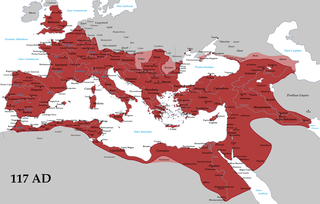Aulus Platorius Nepos was a Roman senator who held a number of appointments in the imperial service. He was suffect consul succeeding the consul posterior Publius Dasumius Rusticus as the colleague of the emperor Hadrian for March–April 119.
Gnaeus Papirius Aelianus Aemilius Tuscillus was a Roman senator and governor of Roman Britain in 146.
Lucius Licinius Sura was an influential Roman Senator from Tarraco, Hispania, a close friend of the Emperor Trajan and three times consul, in a period when three consulates were very rare for non-members of the Imperial family, in 102 and 107 as a consul ordinarius. Fausto Zevi postulated that he was also suffect consul in 97, based in a plausible restoration of part of the Fasti Ostienses, which reads "..]us". However, two more recently recovered fragments of military diplomas show that the name of this consul is L. Pomponius Maternus, who is otherwise unknown. Most authorities have returned to endorsing C.P. Jones' surmise that Sura was consul for the first time as a suffect consul in the year 93.
Lucius Catilius Severus Julianus Claudius Reginus was a Roman senator and general active during the reigns of Trajan and Hadrian. He was appointed consul twice: the first time in 110 CE with Gaius Erucianus Silo as his colleague; the second in the year 120 with the future emperor Antoninus Pius as his colleague. Catilius was also the step-great-grandfather of the emperor Marcus Aurelius.
Titus Prifernius Geminus was a Roman senator who lived in the second century. He is best known as a friend and correspondent of Pliny the Younger, who addresses him as Geminus; he served as quaestor to Pliny for the latter's consulship in AD 100, and five letters Pliny wrote to Geminus have survived. Although the letters convey a genuine friendship between the two, the first one appears only in the latter books of Pliny's collection; Ronald Syme explains this may be due to the fact that he, like Quintus Corellius Rufus and Calestrius Tiro, were living in Rome at the same time as him.
Titus Salvius Rufinus Minicius Opimianus was a Roman senator of the second century. He is known to have served as suffect consul in 123 with Gnaeus Sentius Aburnianus as his colleague. He is also attested as proconsul of Africa in 138/139.
Quintus Glitius Atilius Agricola was a Roman senator and general who held several posts in the emperor's service. He was twice suffect consul: for the first time in AD 97 with Lucius Pomponius Sura as his colleague, and the second time in 103 when he replaced the emperor Trajan. He is the last known person to have held two suffect consulates. Agricola is known only through a large number of fragmentary inscriptions from Augusta Taurinorum, which appears to be his home town.
Marcus Paccius Silvanus Quintus Coredius Gallus Gargilius Antiquus was a Roman senator of the 2nd century AD. He was suffect consul in the nundinium of May-June 119 as the colleague of Quintus Vibius Gallus. Gargilius Antiquus is primarily known through inscriptions.
Lucius Venuleius Apronianus Octavius Priscus was a Roman senator of the second century. He was ordinary consul as the colleague of Quintus Articuleius Paetinus in 123. Subsequent to his consulate, Priscus was proconsular governor of Asia in 138-139. He is known primarily through inscriptions.
Gaius Cilnius Proculus was a Roman senator active during the reign of Domitian. He was suffect consul for the nundinium September–December AD 87 with Lucius Neratius Priscus as his colleague. It is unknown how or if Proculus is related to the better-known Gaius Maecenas. He is known only through surviving inscriptions.
Aulus Caecilius Faustinus was a Roman senator active during the reign of Trajan. He was suffect consul for the nundinium starting in August AD 99 as the colleague of Quintus Fabius Barbarus Valerius Magnus Julianus. Faustinus is known primarily from inscriptions.
Titus Prifernius Paetus Rosianus Geminus was a Roman senator of the second century who held a series of posts in the emperor's service. He was suffect consul for the nundinium of May-June AD 146 as the colleague of Publius Mummius Sisenna Rutilianus.
Gaius Valerius Severus was a Roman senator of the second century. He was suffect consul in the nundinium of September–December 124 as the colleague of Gaius Julius Gallus. Severus is primarily known from inscriptions.
Appius Annius Gallus was a Roman senator and general who flourished during the first century. He held the office of suffect consul in 67 with Lucius Verulanus Severus as his colleague. The suffect consul of 67 is commonly identified as the general who supported Otho during the Year of the Four Emperors.
Aulus Vicirius Proculus was a Roman senator active during the last half of the first century AD. He was suffect consul for the nundinium September–December 89 with Manius Laberius Maximus as his colleague. Proculus is known only through surviving inscriptions.
Titus Vibius Varus was a Roman senator who was ordinary consul in AD 134 as the colleague of Lucius Julius Ursus Servianus, the brother-in-law of the emperor Hadrian. He is known entirely from inscriptions.
Lucius Attius Macro was a Roman senator and general, who was active during the early second century. He was suffect consul in the later part of AD 134 as the colleague of Publius Licinius Pansa. He is known entirely from inscriptions.
Titus Haterius Nepos was a Roman senator and general, who held several imperial appointments during the reign of Hadrian. He was suffect consul in the year 134, immediately succeeding Lucius Julius Ursus Servianus AD 134 as the colleague of Titus Vibius Varus. According to an inscription found in Fulginiae in Umbria, surmised to be his home town, records he received triumphal ornaments for an unspecified military victory, as well as attesting his full name is Titus Haterius Nepos Atinas Probus Publicius Matenianus.

